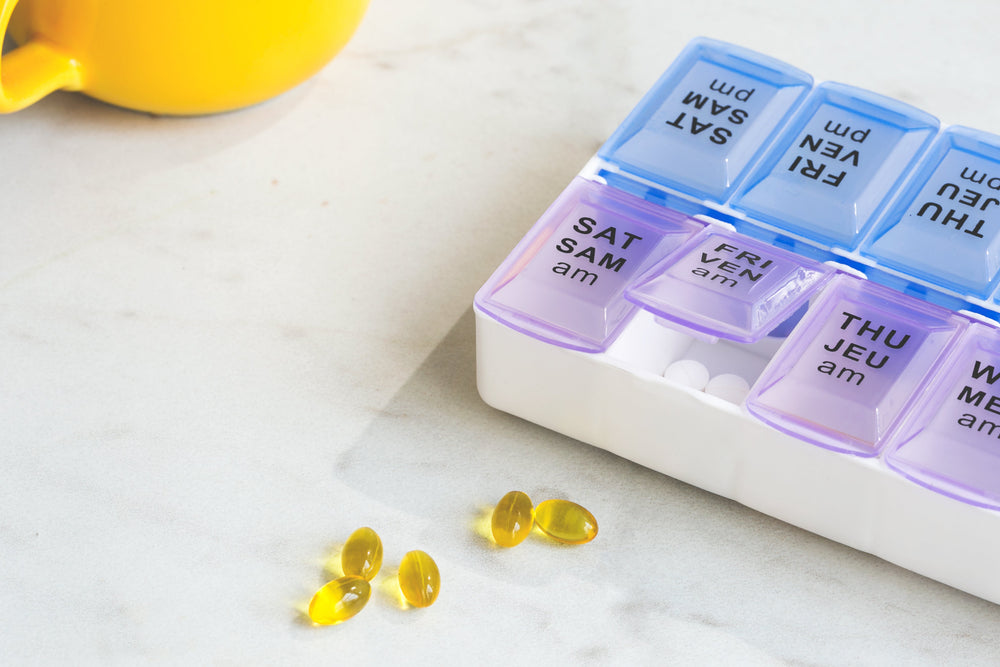You have no items in your shopping cart.

Travelling With Medications: Tips for a Hassle-Free Trip
You're planning a trip, but you're on medication. Don't let this dampen your wanderlust! Travelling with medications doesn't have to be a hassle. With a little preparation, you can ensure your health is taken care of while you're exploring new horizons.
Key Takeaways
- Understand the rules and regulations of your destination and consult with a physician about potential health risks.
- Pack enough medication for the trip's duration, plus extra, and keep medications in original, clearly-labelled containers.
- Include a doctor's note explaining the necessity of your medications and pack a medical ID that lists your medical conditions.
- Be aware of potential restrictions in different countries and research travel regulations of your destination and airline.
What to consider when travelling with medications
When you're planning to travel with medications, there are several key factors you'll need to consider.
It's not just about packing your meds, but also about understanding the rules and regulations of your destination.
You must also think about how to keep your medications safe and effective during your journey.
How to prepare for a hassle-free trip
Before you pack your bags for that long-awaited trip, it's crucial that you carefully plan how to travel with your medications to ensure a seamless journey.
Start by creating a list of all your medications, including their generic names, dosage, and administration instructions.
Next, consult with your physician or pharmacist about your travel plans and any potential health risks. They can provide valuable guidance on managing medication schedules across different time zones, and may suggest a medical alert bracelet in case of emergencies.
Remember to pack enough medication for your trip's duration, plus extra in case of delays. Keep medications in their original, clearly-labelled containers to avoid confusion and customs problems.
Original Packaging
When packing your medications for travel, maintaining them in their original packaging is often a wise choice. There are situations, however, when you might consider whether it's necessary to keep them in their original containers.
The benefits of doing so can greatly influence your travel experience, particularly when it comes to ease of use and security checks.
Important considerations when packing medications in original packaging
Always pack your medications in their original packaging to prevent any confusion or misunderstandings at security checkpoints. This not only helps identify your medications accurately, but it also proves their legality. Moreover, the original packaging often includes crucial information like dosage instructions, precautions, and expiration dates, ensuring you have all necessary details at your fingertips.
Remember, temperature can affect the effectiveness of some medicines. Try to pack them in a cool, dry place. Avoid leaving them in a hot car or near a window exposed to sunlight. Also, be mindful of the liquid restrictions in carry-on luggage if you're flying.
Lastly, always carry a copy of your prescriptions as an extra precaution. This way, you're prepared for a hassle-free travel experience.
When it's okay to leave medications in their original packaging
In most cases, you'll find it's perfectly fine to keep your medications in their original packaging. This is especially true if you're travelling domestically, where customs regulations are often less stringent.
The original container offers important information, such as the dosage, prescription details, and expiration date, which can be crucial in case of an emergency. Also, if you're only taking a short trip, it's easier to keep your medications as they are, reducing the risk of mix-ups.
However, if your medication comes in bulky packaging or if you're travelling internationally, you might need to consider other options. But at the very least, carrying a copy of your prescription is a good idea, just in case you’re checked at security.
Benefits of keeping medications in their original packaging
Keeping your medications in their original packaging offers numerous advantages, especially during travel.
- Ease of Identification: Medications in their original packaging are easier to identify. It prevents any confusion that may arise if they were repackaged. It's also beneficial in case of an emergency, where health professionals can quickly identify your medication.
- Preservation of Information: Original packaging contains vital information about the medication. This includes dosage instructions, expiration dates, and warnings which are essential for safe and effective use.
- Compliance with Regulations: Many countries require that medications be kept in their original packaging while travelling. This is especially important when crossing international borders where customs officials may need to verify your medications.
Counter Medications
You'll find a variety of over-the-counter medications that are essential for a hassle-free trip. These are often easily portable and don't require a prescription, making them convenient travel companions.
- Aspirin
- Ibuprofen
- Acetaminophen
- Antihistamines
- Decongestants
- Antacids
- Laxatives
- Anti-diarrheals
Remember to check the travel regulations of your destination and airline, as certain rules may apply to medication, even those available over-the-counter. With these, you're better prepared for potential health hiccups during your journey, ensuring a smoother and more enjoyable trip.
Restrictions on bringing counter medications onto a plane or other form of transportation
Despite the convenience of over-the-counter medications for travel, it's crucial to be aware of potential restrictions on bringing these medications onto a plane or other form of transportation. Different countries have varying rules, and some mightn't permit certain drugs, even if they're commonly available in your home country. Therefore, it's best to research beforehand to avoid any complications at customs.
Considerations for taking counter medications abroad
Taking a considerable amount of counter medications abroad can pose its own set of challenges, so it's essential you're fully prepared. Here are some considerations:
- Research local laws: Each country has its own rules regarding medications. Check the legality of your medications in your destination country.
- Contact the embassy
- Consult travel advisories
Keep medications in original packaging: This can help avoid unnecessary attention at customs and clarify what the medication is. - Include a doctor's note - Carry a copy of your prescription
Consider the climate: Extreme temperatures can affect your medications. - Keep them in a temperature-controlled bag - Don't leave them in a hot car
Medical Supplies and Equipment
When planning your trip, you should consider what types of medical supplies are necessary to accompany your medications.
This might include items such as syringes, inhalers, and other relevant equipment.
Preparation is key to ensure you're equipped to manage your health while away from home.
What types of medical supplies should be packed when travelling with medication?
So, what essential medical supplies should you pack when planning a trip with medications? You'll need to consider the specifics of your health conditions and treatments, but certain items are generally useful.
- Prescription Medications: Ensure you have enough for your trip, plus extra in case of delays.
- Over-the-counter Medications: Pain relievers, antacids, or allergy meds may come in handy.
- Medical Devices: Don't forget items like blood pressure monitors, insulin pens, or nebulizers.
- Extra Batteries: If your medical devices use batteries, pack extras.
- Medical ID: Carry identification that lists your medical conditions.
- Prescription Copies: In case of loss or emergency, have copies of your prescriptions.
Remember to pack these in your carry-on to keep them accessible and safe.
Preparing medical equipment for travel, such as syringes, inhalers, etc.
Even though you might be an expert at managing your health conditions at home, preparing your medical equipment for travel, such as syringes and inhalers, requires additional considerations.
It's essential to keep your equipment in a safe, easily accessible place. For syringes, ensure they're stored in a sturdy, protective case to prevent damage or accidental pricks.
As for inhalers, keep them in a cool, dry place to avoid impact from extreme temperatures. Also, don't forget to have a clear label on all your equipment to avoid confusion.
Carry a written prescription or a letter from your healthcare provider outlining the necessity of your equipment to facilitate smooth passage through airport security.
Lastly, always pack extra supplies to counter unforeseen circumstances.
Essential Medications
It's crucial to understand which essential medications you'll need for the duration of your trip.
This isn't just about ensuring you have enough of your current prescriptions, but also considering over-the-counter drugs that could be beneficial.
Mapping out your medication needs can help avoid any unwanted health issues and make your trip smoother.
Understanding what essential medicines are necessary for the duration of the trip
When planning your trip, you'll need to determine which medications are crucial for maintaining your health during your travels. Consider these factors:
- If you have ongoing health issues such as diabetes or high blood pressure, it's vital to pack enough medication to last the entire trip.
- Based on where you're going, you may need additional medications. For example, you'll need anti-malarial drugs if you're travelling to certain parts of Africa.
- It's wise to have a basic first-aid kit with essentials like pain relievers and antihistamines.
Conclusion
In conclusion, travelling with medications doesn't have to be a headache.
- Keep them in their original packaging.
- Manage counter medications wisely.
- Make sure essential medications are easily accessible.
Don't forget your medical supplies and equipment.
With a bit of planning and organisation, you'll be on your way to a hassle-free trip. Remember, it's about managing your health while travelling, not letting it manage you.
Safe travels!

This information is intended solely for New Zealand residents and is of a general nature only. No person should act in reliance on any statement contained in the information provided, but at all times should obtain specific advice from a health professional.
